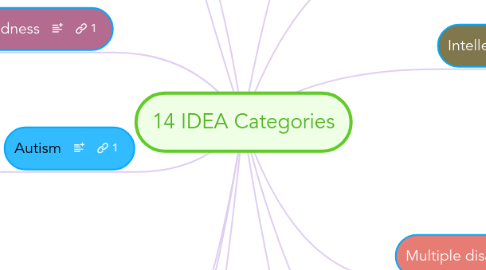14 IDEA Categories
作者:Darleen Cubas

1. Traumatic brain injury
1.1. An acquired injury to the brain caused by an external physical force, resulting in total or partial functional disability or psychosocial impairment, or both, that adversely affects a child’s educational performance.
2. Autism
2.1. A developmental disability affecting verbal and non-verbal communication and social interaction. Diagnosed before the age of three, affects a child's educational performance.
3. Visual impairment, including blindness
3.1. An impairment in vision that, even with correction, adversely affects a child’s educational performance. The term includes both partial sight and blindness.
4. Deaf-blindness
4.1. A disability affecting one's hearing and vision.
5. Speech or language impairment
5.1. A communication disorder such as stuttering, impaired articulation, a language impairment, or a voice impairment that adversely affects a child’s educational performance.
6. Deafness
6.1. Hearing impairment so severe that a child is impaired in processing linguistic information through hearing, with or without amplification, that adversely affects a child's educational performance.
7. Developmental delay
7.1. A delay in one or more of the following areas: physical development; cognitive development; communication; social or emotional development; or adaptive behavioral development.
8. Hearing impairment
8.1. An impairment in hearing, whether permanent or fluctuating, that adversely affects a child’s educational performance.
9. Multiple disabilities
9.1. Simultaneous impairments such as intellectual disability-blindness, intellectual disability-orthopedic impairment. Students cannot be accommodated in a special education program solely for one of the impairments.
10. Other health impairment
10.1. Having limited strength, vitality, or alertness, including a heightened alertness to environmental stimuli, that results in limited alertness with respect to the educational environment.
11. Emotional disturbance
11.1. a condition exhibiting one or more of the following characteristics over a long period of time and to a marked degree that adversely affects a child’s educational performance: This term also includes schizophrenia.
12. Orthopedic impairment
12.1. A severe orthopedic impairment that adversely affects a child’s educational performance. The term includes impairments caused by a congenital anomaly, impairments caused by disease and impairments from other causes.
13. Intellectual disability
13.1. Significantly subaverage general intellectual functioning, existing concurrently [at the same time] with deficits in adaptive behavior and manifested during the developmental period, that adversely affects a child’s educational performance.


